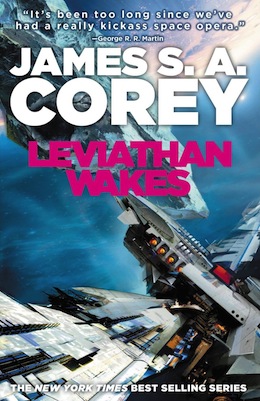It’s been just four-and-a-half years since James S.A. Corey — a pseudonym for Daniel Abraham, author of The Long Price Quartet and The Dagger and the Coin (both fantasy series), and Ty Franck, who was George R.R. Martin’s personal assistant at the time the series debuted — released his ‘debut’ novel, Leviathan Wakes, to both popular and critical acclaim.
Leviathan Wakes was nominated for both the Hugo and Locus Awards, and, with each subsequent volume of The Expanse, the series’ fan-base has grown larger, cementing it as one of Orbit Books’ best selling series. Corey immediately won over fans clamouring for accessible and hip science fiction. While it owes much inspiration to the golden age of Science Fiction — from Poul Anderson and Judith Merril, to Arthur C. Clarke and Alfred Bester — it’s also undeniably modern, featuring a rich, diverse cast of characters, relevant politics, and a snappy prose style that’s perfect for tugging readers from one chapter to the next even in this age of distractions.
One of the ways in which Leviathan Wakes distinguishes itself is by being a Space Opera/Military SF hybrid set entirely within the bounds of our solar system—even the Epstein Drive, a high-powered engine capable of near-c, is still not enough to power the human race beyond the asteroid belt between Mars and Jupiter. Instead of the sprawling canvas of many Space Operas, Leviathan Wakes focuses instead on the conflicts of a human race still in the infancy of space colonization—more akin in scope to Lois McMaster Bujold’s Vorkosigan Saga or Ursula K. Le Guin’s The Dispossesed than Peter F. Hamilton’s Night’s Dawn Trilogy or Vernor Vinge’s A Fire Upon The Deep.
Corey first imagined this setting as the home of a Massively Multiplayer Online RPG, focusing more on interpersonal conflicts and political intrigue than vast space exploration. “[He] imagined a solar system that included major settlements on the Moon, Mars, the asteroid belt, and the more distant planets, ruled by three major factions: Earth, Mars, and the Outer Planets,” wrote Andrew Liptak of the Barnes & Noble Sci-Fi & Fantasy blog in his comprehensive history of the series. “Inserted into this balance was a fourth party: an alien influence infiltrating the solar system. … Guided by a grand terraforming plan, Mars strip mined the solar system for raw materials such as water, putting them into conflict with the residents of the asteroid belt and the outer planets.” It’s about the vastness of space and human ambition held back by technology, and the pressure cooker that ensues when the keys to the universe fall into the wrong hands.
When the MMORPG route did not take off, Corey adapted the setting for the tabletop, and his regular gaming group began to exploring the social and political implications of a solar system on the verge of civil war. With this tight focus comes a reliance on an interesting cast of characters, another sign of its roots as a character-driven RPG setting, and the cast is where Leviathan Wakes shines brightest. In fact, many of the characters in the novel were created by Corey and his friends while playing the tabletop RPG. The “Space Western”, featuring the missions of a spaceship piloted by a likeable crew with morally questionable backgrounds, is hardly a new idea in science fiction, having been executed brilliantly by TV shows like Cowboy Bebop and Firefly, and in novels like Mike Resnick’s Santiago: A Myth of the Far Future and the Paradox Trilogy by Rachel Bach. With themes of colonialism, racism, exploration, gunslingin’, and adventure right at the heart of Leviathan Wakes, it’s certainly a Space Western, and like the shows and novels mentioned above, it succeeds because the reader has so much fun following Jim Holden’s band of merry mischief-makers on their many misadventures.
At first it’s a little puzzling to see such a talented and likeable crew stuck aboard the Canterbury, a stodgy old water hauler. As Corey slowly reveals their pasts, however, tracing the path of their former lives to the Canterbury and eventually to the Rocinante, the reader begins to feel like one of the crew—an outcast with the weight of the solar system on her shoulders. What’s remarkable (and more obvious the second time I read the novel) isn’t just the way Holden interacts with his crew, but the camaraderie that exists between them, and the bonds that cement themselves during the search for Julie Mao and the race to uncover the mystery of the mysterious Protomolecule. Several times, Naomi, Amos, and Alex follow Holden into hairy situations, not just because of their respect for their captain and his authority, but because of a mutual respect for one another. Together they are stronger, more diverse, and interesting than they are apart. Leviathan Wakes is about humanity dreaming of the stars, but it’s also about the personal journeys of those aboard Jim Holden’s Rocinante.
If Holden and his crew are the highlight of the novel, Joe Miller—the downtrodden Belter detective with nothing to lose—is the novel’s weakest link. Late in the novel, Fred Anderson, leader of the Outer Planets Alliance, describes Miller with perfect clarity: “That man,” he says, “could take a visitation from God with thirty undressed angels announcing that sex was okay after all and make it seem vaguely depressing.” At the end of the day, Miller is Corey’s stab at writing a traditional noir hero—tormented, misunderstood, angry. However, even on his road to redemption, Miller is unable to form an emotional bond with the reader, lacking the balance of charisma and edginess found in the protagonist of a good Elmore Leonard or Dorothy B. Hughes mystery novel. There’s a brief period, when Miller crosses paths with Holden, during which Miller reveals who he might have been before his wife left him, before his career started to slide downhill, and this elicits the smallest glimmer of empathy for the guy. But it’s so faint, snatched away so quickly, that it ends up as nothing more than a pity. Miller’s self-hate is a chore, and usually the only reward for pushing through his chapters is getting back to the next stretch of Holden.
However, one thing Miller’s storyline does very well is illustrate the way war involves both large sociopolitical stakes, but also smaller, more intimate personal stakes. Miller’s story begins with his investigation into the whereabouts of Julie Mao, leading, along with Holden’s discovery aboard a derelict starship, to the first hints of a war being orchestrated by a mysterious rabble-rouser. The search for Mao is political at its beginnings, and continues as such for Holden, but for Miller, who watches his personal life crumble around him, it becomes personal—she becomes a symbol of his desire to prove, even to himself, that he’s still capable of being a good cop.
When I first reviewed Leviathan Wakes, I called it “Space Opera for the masses.” I lauded it for being open and approachable for anyone with even a remote interest in science fiction, but specifically for those who are intimidated by the hard science that often forms the backbone Space Opera. It focuses instead on the intricacies of the human machine — relationships, anxieties, dreams, loss, redemption, acceptance. It’s this exact focus on approachable, character-driven SF that makes The Expanse perfect for a television adaptation.
Opening her review, Annalee Newitz of io9 immediately likened Leviathan Wakes to a blockbuster SF film. “When you dive into Leviathan Wakes,” she wrote, “you’ll feel like you’re watching the opening scene in any of a dozen awesome science fiction films. … [It’s] the perfect thing for a long summer afternoon by the beach or the air conditioner.” Newitz didn’t know it at the time, but her words were prophetic.

The best bits of Leviathan Wakes are the little moments between its cast — Miller and Holden dodging thugs and zombies on Ceres, the last moment of communication between Holden and the Canterbury, Miller asking a favour of Havelock, Naomi shutting Holden down — all are emotional and dialogue driven, perfect for television. Sure, there’s plenty of space combat, action, and large-scale setpieces in the novel, but more often than not, Holden’s quick mind, clever words, and sharp diplomacy are better at shielding his crew from oncoming missiles than any force field.
“[There are] shades of our world in the characters — specific accents, monuments from the world cities, things that link this story back to our world in ways that Star Wars and Battlestar Galactica don’t,” Ben Cook, show producer, told Liptak. After securing the rights for the series, Cook brought on Mark Fergus and Hawk Otsby as screenwriters. “One of the major elements that attracted Fergus and Otsby to The Expanse was its focus on characters,” Liptak revealed from his conversation with Cook. “They were tired of technological science fiction stories. This was an opportunity to tell a rich, character-driven tale.”
There’s even an over-the-top, perfect for television theatricality to the escalating war between Earth and Mars, with the Belt caught in-between. Readers never have more than a nebulous understanding of the end goals for the two human planets. So much is hand-waved away in Leviathan Wakes, which is a perfect fit for a medium in which literally every second of screen-time counts, freeing the writers to focus on their characters. Even the structure of the novel, which alternates between Holden and Miller every chapter, provides an episodic narrative, and is chock-full of perfect cliffhangers to keep television viewers coming back each week.
The pilot episode of The Expanse, “The Dulcinea,” released by SyFy in mid-November, is already proving that Cook, Fergus, and Otsby’s dedication to preserving Corey’s character-driven narratives is as rich an experience on the screen as it is in the books. If the excitement and hype for the adaptation is any indication, The Expanse is set to become the biggest Science Fiction franchise this side of Star Wars, with all the potential to become SyFy’s far-future version of Game of Thrones.
Hugo Award winner Aidan Moher is the founder of A Dribble of Ink and author of Tide of Shadows and Other Stories. He regularly contributes to Tor.com, the Barnes & Noble SF&F Blog, and several other websites. He lives on Vancouver Island with his wife and daughter.










